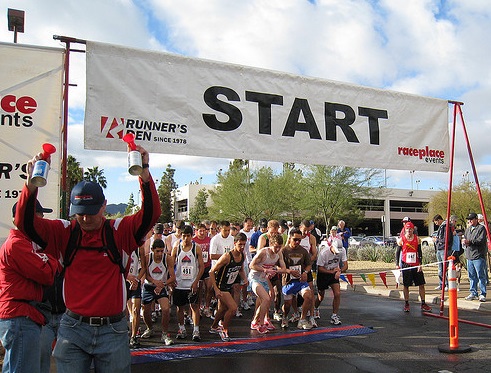|
There is an ongoing debate of whether running is beneficial to your health or whether it will make you injured and overtrained. Those against running are usually the people who are not good at it or those where cardiovascular endurance is of lower priority to their other athletic goals. They do however, have some good points as to the negative effects of running. Some people keep running even though they don’t like it. I’ve had many clients who hated running but still continued to do so because it helped them lose weight or just feel better afterwards. They still continue to run even though they don’t like it. Some say it is a recipe for injury and that it won’t really make you lose any fat. Others say it is an easy to do, convenient exercise that will shed the pounds faster than any other activity. So which is it? I became a runner I’ve logged a lot of miles on the trails, paths, and streets. As a kid I hated running, but wanted to get better at to improve my conditioning for wrestling. I forced myself to do it for about 2 years until I began to like it. Then I loved it. For 2 years while in college, I ran 30 miles a week along with lifting weights 4 days a week. I’ve done 5k, 10k, and half marathon races. There was also a time where I didn’t run for about 5 years until picking it back up again. I’ve been the distance guy running anywhere from 3-10 miles a run, to the sprinter only doing intervals of all out speed. I’ve seen results as well as injury and sickness from training at either distance. One summer, running helped me get 15 lbs leaner. Some years later when I started running again after a break, it made me lose weight including muscle so I became skinnier, not leaner. It’s made me feel healthier, more flexible, and agile. It’s also given me back pain, muscle cramping, and frequent cold/flus. The Pros and Cons of RunningThe Pros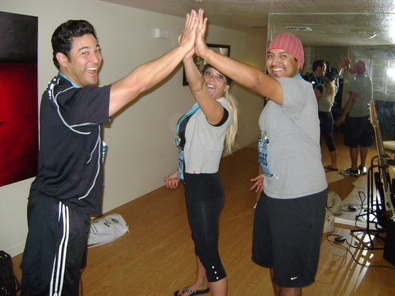 Phoenix Half Marathon! Yes, we were trying to be cheesy, but pumped nonetheless! Phoenix Half Marathon! Yes, we were trying to be cheesy, but pumped nonetheless! It’s very motivational There’s something special about completing a run. Whether it be a 3 mile solo run or The New York marathon, the feeling of accomplishment and success is indescribable. This motivates people to run harder and more frequently, usually leading to better results.*taken from Runner’s World, Calories Burned Calculator Running burns A LOT of calories Most people who take up running usually lose a substantial amount of weight. Running is a tough activity and it burns a lot of calories. A 5 mile, 50 min run for a 140 and 190 pound person burns 529 and 718 calories respectively*. As long as the new runner keeps their nutrition clean, they will typically lose weight just from the extra activity. 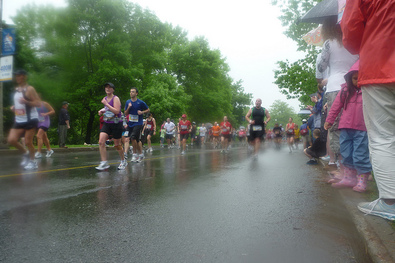 From Active Steve on Flickr. http://creativecommons.org/licenses/by-nd/4.0/ From Active Steve on Flickr. http://creativecommons.org/licenses/by-nd/4.0/ It’s convenient and can be done anywhere The biggest reason I suggest running to my clients is because you can step outside your front door and start running. No additional equipment is needed other than a solid pair of running shoes. If it’s hot, run in the morning or evening. If it’s cold or raining, wear some extra layers. Your only excuses are blizzards, severe cold, or lightning. You readers here in California have no excuse year round. We were meant to run to some degree People have been running since the dawn of Homo sapiens for food, transportation, and to escape danger. There is something very liberating about running which is probably the main reason people fall in love with it. We were meant to run or even “Born to Run” as the popular book coined. But how much running is too much? The Cons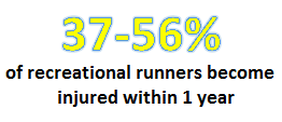 It is a repetitive, high impact activity that causes injury Within the course of a year, the recreational runner has a 37-56% chance of being injured. 50-75% of these are repetitive strain injuries. The most common are knee injuries, followed by ankle and low back injuries. I believe this occurrence can be greatly reduced if the proper strength and flexibility program is applied. Running may not cause fat loss If you take up running you will likely lose weight. You may even be lucky enough only lose fat without sacrificing muscle. What I often see is the new runner loses weight, then plateaus within a few months. I’ve seen some who never lose any weight. Now nutrition has a lot to do with fat loss, BUT runners tend to be a good candidate for plateaus. Some more athletic and muscular individuals may find an equal amount of fat and muscle loss after a few months of distance running as I did. The result is a skinnier you, NOT leaner. Some do not take to running because of basic physiology Some people are not runners. They become injured within a couple weeks or they have a very awkward gait of which they are well aware of. Running is not part of their DNA. If you run like Phoebe from Friends, trying to become a runner would likely leave you injured. Distance running is systemically stressful on your body There are many studies of endurance athletes both recreational and competitive that show signs of high stress on the body. Some would say the ultra endurance athletes practically swim in their own pool of cortisol. Heightened levels of cortisol and other stress hormones are associated with the sympathetic nervous system or “fight or flight” response is often found to be higher in endurance athletes compared with other athletes. With respect to proper research, some studies say this is true while others are inconclusive. In my opinion, I believe runners tend to be over exposed to cortisol more often than the average exerciser. They also tend to have more oxidative stress on their body. In my own personal experience, I got sick much more often when I was a “runner” than not. OR if I was doing too much cardio in the gym. Distance Running vs. Sprinting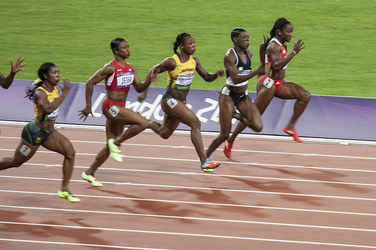 Flicker.com. catfordCelt's. http://creativecommons.org/licenses/by-nd/4.0/ Flicker.com. catfordCelt's. http://creativecommons.org/licenses/by-nd/4.0/ There has been a lot of hype in the last few years on the extraordinary benefits of sprinting. It is a great form of cardio and it has a better metabolic response compared to distance running, but is it THAT much better? Sprinting can offer some great results and if my clients choose to run for their cardio, I typically suggest sprinting or interval running. It almost always gets better results IF they do it. If I tell them go to the track, warmup with 2 laps, then do 2 150s, 2 100s, and 2 50s, it will probably never happen. If I simply tell a client to go run, they are more likely to do it. Sprinting takes a somewhat measured distance, more thought, and yes, more effort. Even though many people know how beneficial sprinting is, they often skip it because it takes more effort. So, should you run?If you like running, do it. I often suggest running to my clients who at one time ran consistently because they really enjoyed it, but stopped for whatever reason. It burns a lot of calories, it’s satisfying, and it can help you lose fat if done correctly. For any runner, a minimum of 2 times a week of weight training is crucial to stave off injury. A solid flexibility program is essential for the same reason.
If you are not a runner and don’t care to be, then find another activity that can help you burn calories and increase your cardiovascular fitness. Swimming, cycling, rowing, HIIT workouts, or martial arts are great cardio workouts. For those concerned of losing muscle from cardio, do sprints, Metabolic, HIIT, or Stongman workouts. You will keep your muscle and gain cardiovascular and muscular endurance, athleticism, and strength. References: 1) van Mechelen W. Running injuries. A review of the epidemiological literature. Sports Med. 1992 Nov;14(5):320-35. 2) Marzatico F, Pansarasa O, Bertorelli L, Somenzini L, Della Valle G. Institute of Pharmacology, University of Pavia, Italy. Blood free radical antioxidant enzymes and lipid peroxides following long-distance and lactacidemic performances in highly trained aerobic and sprint athletes. The Journal of Sports Medicine and Physical Fitness [1997, 37(4):235-239] 3) Nadine Skoludaa, b, Lucia Dettenborna, c, Tobias Staldera, Clemens Kirschbauma. Elevated hair cortisol concentrations in endurance athletes. Psychoneuroendocrinology Volume 37, Issue 5, May 2012, Pages 611–617 4) Tremblay A, Simoneau JA, Bouchard C. Impact of exercise intensity on body fatness and skeletal muscle metabolism. Metabolism 1994; 43 (7): 814-8. 5) Marcus C.C.W. Elliott, Phillip P. Wagner, and Loren Chiu, Power Athletes and Distance Training, Physiological and Biomechanical Rationale for Change. USC Sports Med 2007, vol 37, issue 1.
0 Comments
Leave a Reply. |
AuthorJerry Yuhara, CPT, CSCS, CMT #75123 Categories
All
JY Fitness
299 California Ave, Suite 120 Palo Alto, CA 94306 650-485-1240 contact@jyfit.com Contact Copyright JY Fitness 2024, All Rights Reserved. Find us on Nextdoor.com
|
